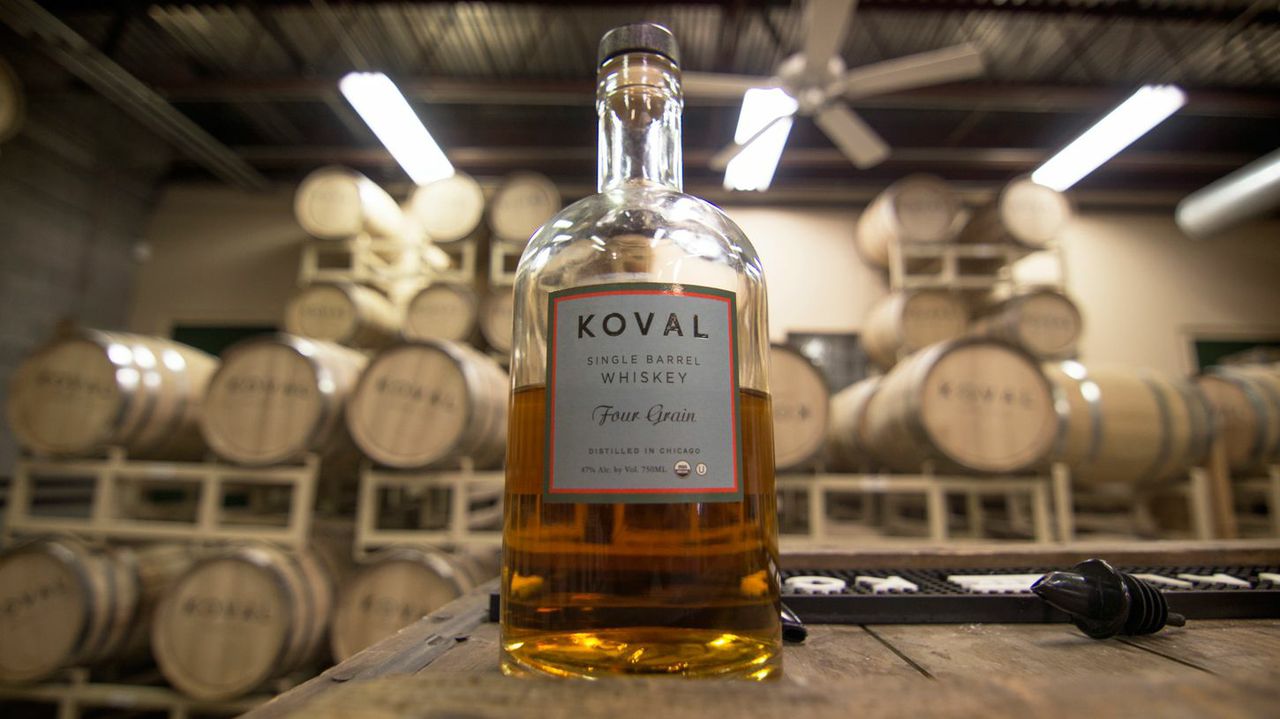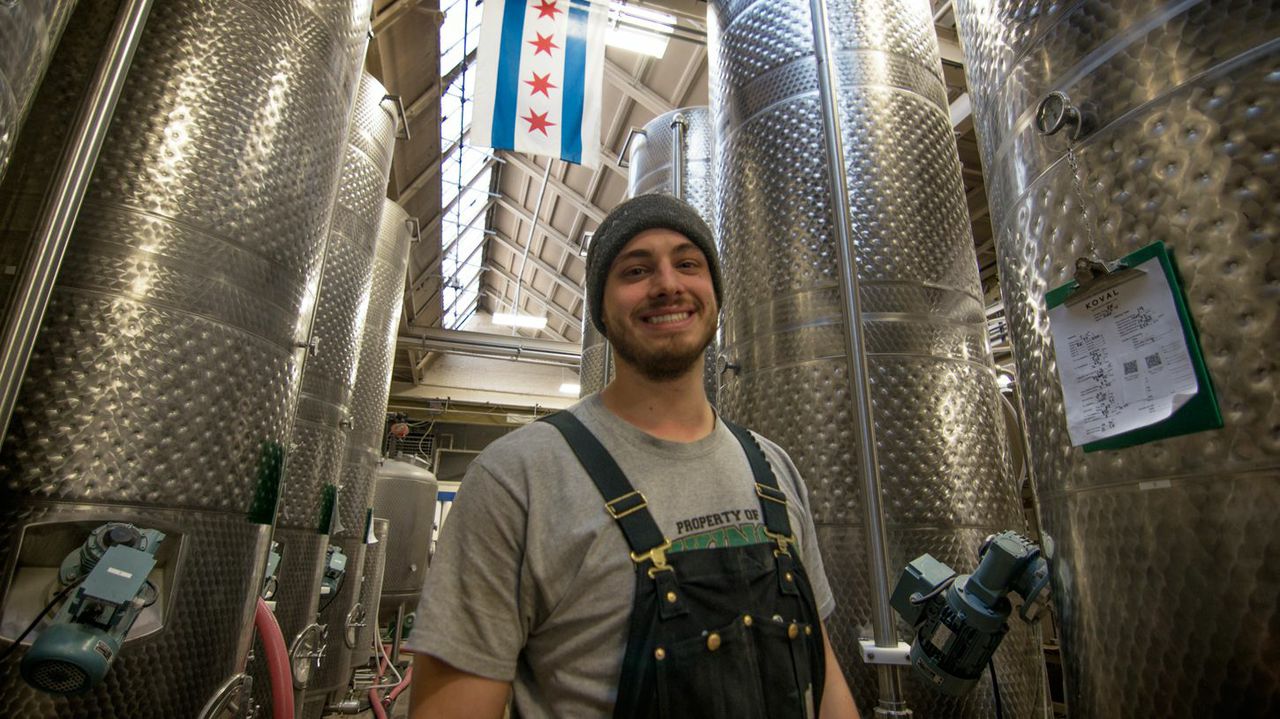
Thanks to notorious characters such as Al Capone, Chicago’s Prohibition era left the city with a scandalous reputation that lasted until well after the government’s ban on alcohol was repealed in 1933. Home to both infamous gangsters and one of the nation’s most active temperance movements, speakeasies and bootlegging thrived conspicuously throughout the 1920s, creating an energetic underground culture that the city’s government struggled to control. Even after liquor legally flowed once more in homes and bars across the city, there had been no distilleries producing spirits within Chicago’s city limits since the mid-1800s.
This all changed seven years ago when Robert and Sonat Birnecker opened KOVAL in the city’s historic Ravenswood neighborhood as part of a lifestyle change that relocated the couple from Washington, D.C. to Chicago. Originally from Austria, Robert Birnecker grew up working in his grandfather’s distillery, and saw KOVAL as an opportunity to pay homage to the man who taught him the art of distilling while creating something of his own from scratch.
Attempting to open the first distillery in Chicago in over two centuries came with challenges, and the Birndeckers had to petition local government in order to make KOVAL a reality.
“Since Sonat grew up in the city, she knew that it would help to have an alderman on our side,” said Birnecker. “She sent out letters and eventually got in touch with [Alderman] Gene Schulter, who helped us find our first production facility. Sonat also had to go to Springfield and lobby so that we could sell our product on-site.”

When KOVAL began production in 2008, the distillery relied on a 300-liter still and bottled approximately four barrels a day. They’ve since expanded to a 5,000-liter still and are now bottling eight to ten barrels a day, and are distributing to 10 different countries directly from their Ravenswood facility.
The original KOVAL business plan focused on fruit-based spirits, but climate complications prompted an expansion into other liquors.
“Our first shipment of pears came in during the winter and actually froze en route,” said Birnecker. “The flavor wasn’t as strong, so we decided to work with what was available to source locally at the time– grain.”
The Birneckers started with a grain spirit they dubbed White Rye Whiskey, and eventually began producing aged grain whiskeys. Sometimes referred to as “white lightning,” the White Rye is a completely clear alcohol that does not undergo any type of aging process. It is available for sale at the KOVAL shop alongside their millet, oat, and rye whiskeys.
Becky Schultz, the Public Relations Coordinator at KOVAL, gave us a tour of the distillery and explained the process of converting 20,000-pound grain shipments into whiskey, bourbon, and gin.
“We do everything in-house,” said Schultz. “The overall grain-to-bottle process takes about two years.”

The barrels used at KOVAL are made from American white oak sealed with beeswax, adhering to the distillery’s USDA organic and kosher certifications. The interior of the barrels has a medium char, which gives the alcohol its taste during the aging process.
“We don’t add any flavors,” said Schultz. “Everything you get in the bottle came that way out of the barrel.”
The character of KOVAL whiskeys is defined by the specific blend of grains used by the distillery.
“Of the single grains we have rye, oat, wheat, spelt, and a millet, which is a West African grain,” said Schultz. “The millet and the oat are our most unique grains, and we were one of the first distilleries to use them 100% in our whiskeys.”

The KOVAL staff takes pride in the distillery’s commitment to presiding over every aspect of their spirit-making process. Mike Hoffman, KOVAL’s Distillery Manager, firmly believes in the importance of guaranteeing high-quality ingredients.
“We start with whole, organic grains and bottle everything right here in this building, which is pretty cool and unique,” said Hoffman.
The Birneckers are passionate about sharing the story behind KOVAL and the production techniques used by the distillery.
“We mark each of our bottles with the barrel number, which can be traced all the way back to the grain shipment that barrel of whiskey was made with,” said Birnecker.

He also wanted the label and package design to reflect KOVAL's overall mission of crafting clean, organic, luxury spirits from scratch.
“Our branding and labels are done by Sonat’s sister, Oona Hart, of Dando Projects, said Birnecker. “The minimal and clean design of our brand reflects just that.”
We asked a few of the KOVAL team members to share some of the drinks they enjoy making with KOVAL spirits. Morgan Maxwell, KOVAL’s Administrative Assistant, recommends using the White Rye as a vodka substitute for cocktails. Birnecker suggests the millet whiskey in a classic Manhattan, to be enjoyed in the evening with “something quieter, like Sam Smith.”


Share:
The Sound Vol. 4: Une Petite Fête
Behind the Bar: The Double Barrel